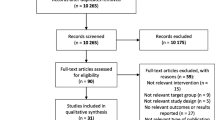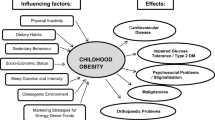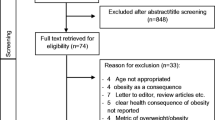Abstract
Purpose
Parental perception of their child’s weight may be a crucial factor in parental ability for action with regard to their child’s weight problem. This aim of this study was to investigate parental perception of their child’s weight status and dietary healthiness, amount of food consumed and physical activity level and its related factors.
Methods
A cross-sectional survey was conducted among children (Grades 4–6) selected by cluster sampling in two schools. Children were invited to participate in the measurements of anthropometry and their parents were asked to classify their child’s weight and health behaviors.
Results
In total, 41.8% of parents misperceived their child’s weight, of which 82% underestimated their child’s weight, in particular regarding overweight or obesity. As parents of overweight or obese children underestimated their child’s weight, around 65% were not concerned with their child’s current weight and about becoming overweight in the future. Factor associated with underestimation of overweight children was not having a sibling, while among children with normal weight, the underestimation was associated with boys, lower body mass index (BMI), maternal employment and low household income. Furthermore, parents underestimating their child’s weight were more likely to be optimistic about their child’s dietary healthiness, food amount taken, and physical activity level than those with correct child’s weight estimates.
Conclusions
Findings show a high proportion of parental misperception of their child’s weight status. Family-based weight control interventions will need to incorporate parental misperceptions of the body weight and health behaviors of their children.

Similar content being viewed by others
References
Ramachandran A, Snehalatha C (2010) Rising burden of obesity in Asia. J Obes. doi:10.1155/2010/868573
Aekplakorn W, Hogan MC, Chongsuvivatwong V, Tatsanavivat P, Chariyalertsak S, Boonthum A et al (2007) Trends in obesity and associations with education and urban or rural residence in Thailand. Obesity (Silver Spring) 15:3113–3121. doi:10.1038/oby.2007.371
Pitayatienanan P, Butchon R, Yothasamut J, Aekplakorn W, Teerawattananon Y, Suksomboon N et al (2014) Economic costs of obesity in Thailand: a retrospective cost-of-illness study. BMC Health Serv Res 14:146. doi:10.1186/1472-6963-14-146
Yamborisut U, Mo-Suwan L (2014) Prevalence of childhood and adolescent obesity in Thailand: a review. J Med Assoc Thail 97:44–51
Sirikulchayanonta C, Pavadhgul P, Chongsuwat R, Klaewkla J (2011) Participatory action project in reducing childhood obesity in Thai primary schools. Asia Pac J Public Health 23:917–927. doi:10.1177/1010539510361965
Golan M (2006) Parents as agents of change in childhood obesity-from research to practice. Int J Pediatr Obes 1:66–76
Summerbell CD, Waters E, Edmunds LD, Kelly S, Brown T, Campbell KJ (2005) Interventions for preventing obesity in children. Cochrane Database Syst Rev 20(3):CD001871. doi:10.1002/14651858.CD001871.pub2
Moore LC, Harris CV, Bradlyn AS (2012) Exploring the relationship between parental concern and the management of childhood obesity. Matern Child Health J 16:902–908. doi:10.1007/s10995-011-0813-x
Jeffery AN, Voss LD, Metcalf BS, Alba S, Wilkin TJ (2005) Parents’ awareness of overweight in themselves and their children: cross sectional study within a cohort (EarlyBird 21). BMJ 330:23–24. doi:10.1136/bmj.38315.451539.F7
Kim KH (2007) Religion, weight perception, and weight control behavior. Eat Behav 8:121–131
Lampard AM, Byrne SM, Zubrick SR, Davis EA (2008) Parents’ concern about their children’s weight. Int J Pediatr Obes 3:84–92. doi:10.1080/17477160701832552
Tschamler JM, Conn KM, Cook SR, Halterman JS (2010) Underestimation of children’s weight status: views of parents in an urban community. Clin Pediatr (Phila) 49:470–476. doi:10.1177/0009922809336071
Rietmeijer-Mentink M, Paulis WD, van Middelkoop M, Bindels PJ, van der Wouden JC (2013) Difference between parental perception and actual weight status of children: a systematic review. Matern Child Nutr 9:3–22. doi:10.1111/j.1740-8709.2012.00462.x
Hansen AR, Duncan DT, Tarasenko YN, Yan F, Zhang J (2014) Generational shift in parental perceptions of overweight among school-aged children. Pediatrics 134:481–488. doi:10.1542/peds.2014-0012
Sand L, Lask B, Hysing M, Stormark KM (2014) In the parents’ view: weight perception accuracy, disturbed eating patterns and mental health problems among young adolescents. J Eat Disord 2:9. doi:10.1186/2050-2974-2-9
Sylvetsky-Meni AC, Gillepsie SE, Hardy T, Welsh JA (2015) The impact of parents’ categorization of their own weight and their child’s weight on healthy lifestyle promoting beliefs and practices. J Obes 2015:307381. doi:10.1155/2015/307381
De La OA, Jordan KC, Ortiz K, Moyer-Mileur LJ, Stoddard G, Friedrichs M et al (2009) Do parents accurately perceive their child’s weight status? J Pediatr Health Care 23:216–221. doi:10.1016/j.pedhc.2007.12.014
Lopes L, Santos R, Pereira B, Lopes V (2013) Maternal perceptions of children’s weight status. Child Care Health Dev 39:728–736. doi:10.1111/j.1365-2214.2012.01380.x
Mathieu ME, Drapeau V, Tremblay A (2010) Parental misperception of their child’s body weight status impedes the assessment of the child’s lifestyle behaviors. Int J Pediatr. doi:10.1155/2010/306703
Lee RD, Nieman DC (1993) Nutritional assessment. Brown & Benchmark, Oxford
Reilly JJ, Kelly J, Wilson DC (2010) Accuracy of simple clinical and epidemiological definitions of childhood obesity: systematic review and evidence appraisal. Obes Rev 11:645–655. doi:10.1111/j.1467-789X.2009.00709.x
Navder KP, He Q, Zhang X, He S, Gong L, Sun Y et al (2009) Relationship between body mass index and adiposity in prepubertal children: ethnic and geographic comparisons between New York City and Jinan City (China). J Appl Physiol 107:488–493. doi:10.1152/japplphysiol.00086.2009
Cole TJ, Bellizzi MC, Flegal KM, Dietz WH (2000) Establishing a standard definition for child overweight and obesity worldwide: international survey. BMJ 320:1240–1243. doi:10.1136/bmj.320.7244.1240
Cole TJ, Lobstein T (2012) Extended international (IOTF) body mass index cut-offs for thinness, overweight and obesity. Pediatr Obes 7:284–294. doi:10.1111/j.2047-6310.2012.00064.x
Campbell MW, Williams J, Hampton A, Wake M (2006) Maternal concern and perceptions of overweight in Australian preschool-aged children. Med J Aust 184:274–277
Baughcum AE, Powers SW, Johnson SB, Chamberlin LA, Deeks CM, Jain A et al (2001) Maternal feeding practices and beliefs and their relationships to overweight in early childhood. J Dev Behav Pediatr 22:391–408
Brug J, Wammes B, Kremers S, Giskes K, Oenema A (2006) Underestimation and overestimation of personal weight status: associations with socio-demographic characteristics and weight maintenance intentions. J Hum Nutr Diet 19:253–262. doi:10.1111/j.1365-277X.2006.00707.x
Spargo M, Mellis C (2014) Childhood obesity and parental perceptions in a rural Australian population: a pilot study. J Paediatr Child Health 50:131–134. doi:10.1111/jpc.12417
Nihiser AJ, Lee SM, Wechsler H, McKenna M, Odom E, Reinold C et al (2009) BMI measurement in schools. Pediatrics 124(Suppl 1):S89–S97. doi:10.1542/peds.2008-3586L
Weinstein ND (1982) Unrealistic optimism about susceptibility to health problems. J Behav Med 5:441–460
Jay M, Stepney C, Wijetunga NA, Akinrinade G, Dorsey K, Bruzzese JM (2013) Accuracy of weight perception among urban early adolescents with uncontrolled asthma and their caregivers. Ann Behav Med 45:239–248. doi:10.1007/s12160-012-9452-8
Weinstein ND (1989) Effects of personal experience on self-protective behavior. Psychol Bull 105:31–50. doi:10.1037/0033-2909.105.1.31
Wald ER, Ewing LJ, Cluss P, Goldstrohm S, Cipriani L, Colborn DK et al (2007) Parental perception of children’s weight in a paediatric primary care setting. Child Care Health Dev 33:738–743. doi:10.1111/j.1365-2214.2007.00753.x
Chen S, Binns CW, Maycock B, Zhao Y, Liu Y (2014) Chinese mothers’ perceptions of their child’s weight and obesity status. Asia Pac J Clin Nutr 23:452–458. doi:10.6133/apjcn.2014.23.3.14
Tantleff-Dunn S, Gokee JL (2002) Body image: A handbook of theory, research, and clinical practice. In: Cash TF, Pruzinsky T (eds) Interpersonal influences on body image development. Guilford Press, New York
Smolak L (2002) Body image: A handbook of theory, research, and clinical practice. In: Cash TF, Pruzinsky T (eds) Body image development in children. Guilford Press, New York
Whitchurch G, Constantine L (1993) Sourcebook of family theories and methods: a contextual approach. In: Boss P, Doherty WJ, LaRossa R, Schumm WR, Steinmetz SK (eds) Systems theory. Plenum Press, New York
Rieves L, Cash TF (1996) Social developmental factors and women’s body image attitudes. J Soc Behav Pers 11:63–78
Coomber K, King RM (2008) The role of sisters in body image dissatisfaction and disordered eating. Sex Roles 59:81–93. doi:10.1007/s11199-008-9413-7
Sutcliffe CG, Schultz K, Brannock JM, Giardiello FM, Platz EA (2015) Do people know whether they are overweight? Concordance of self-reported, interviewer-observed, and measured body size. Cancer Causes Control 26:91–98. doi:10.1007/s10552-014-0487-y
Acknowledgements
This research was supported by Thai Physical Activity Research Center–PARC, Thai Health Promotion Foundation.
Author information
Authors and Affiliations
Corresponding author
Ethics declarations
Conflict of interest
The authors had no conflict of interest and nothing to disclose.
Ethical approval
Before commencement of the study, ethical approval was granted from the Human Research Ethics Committee (HREC), Mahidol University. All procedures performed in this study were in accordance with the ethical standards of the institutional and/or national research committee and with the 1964 Helsinki declaration and its later amendments or comparable ethical standards.
Informed consent
Informed consent was obtained from all individual participants included in the study.
Rights and permissions
About this article
Cite this article
Hong, S.A., Peltzer, K. & Jalayondeja, C. Parental misperception of child’s weight and related factors within family norms. Eat Weight Disord 24, 557–564 (2019). https://doi.org/10.1007/s40519-017-0399-4
Received:
Accepted:
Published:
Issue Date:
DOI: https://doi.org/10.1007/s40519-017-0399-4




